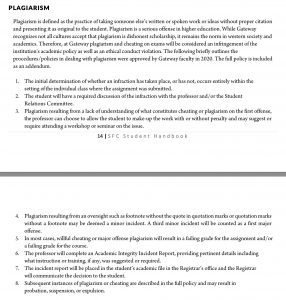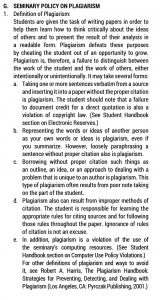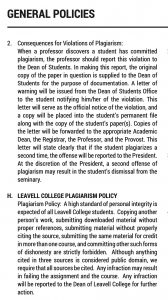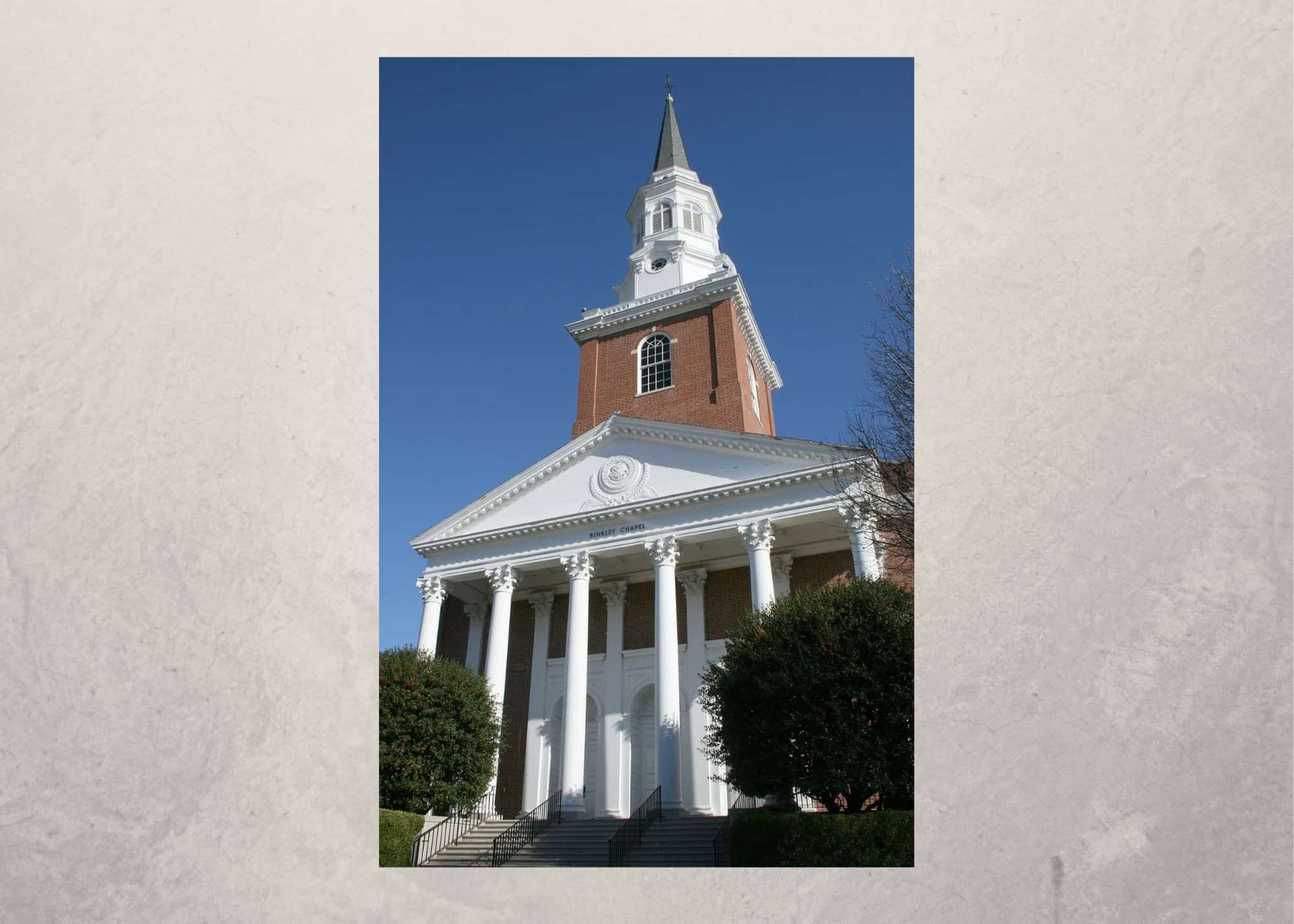Go here to read an article about the mounting evidence of plagiarism in which newly elected SBC president Ed Litton has been engaged. The article contains a listing of these policies.
The following information on each seminary’s policy against plagiarism is representative but not exhaustive.
Gateway Seminary Student Handbook, San Francisco Campus


MBTS Information on Academic Integrity
It cannot be exaggerated how strongly Midwestern deplores plagiarism in all its forms. Dishonesty is incompatible with the very purpose for which a student avails himself of its ministries. It is to be desired that one remain without a degree rather than to obtain it by dishonest means, for Christianity cannot countenance conduct that contradicts its basic tenets. It is further to be hoped that each individual will recognize a responsibility for his brother as well as for himself in all such matters.


SEBTS Academic Policies for All Students
ACADEMIC INTEGRITY/POLICY ON PLAGIARISM
ACADEMIC INTEGRITY
Students often have class assignments that involve academic research. In preparing their papers and other assignments, students must not copy the work of others. Any direct quotations must be documented. Summaries and paraphrased materials must also be noted with reference in the text or notes to the original sources. Students should document their sources and maintain the highest standards of academic integrity in all of their work. Plagiarism, cheating on tests, and other forms of academic fraud will not be tolerated. Students who engage in such activity will receive a failing grade on any fraudulent work and may receive a failing grade for the course. All instances of such behavior will be recorded on an offending student’s record with the Registrar and Deans. In addition, the Dean of Students reserves the right to take disciplinary action against those guilty of such behavior.
SOUTHEASTERN POLICY ON PLAGIARISM
Students in attendance at Southeastern are expected to maintain high standards of academic integrity appropriate to a Christian lifestyle. Plagiarism and cheating in any form will not be tolerated.
Integrity requires that the Christian student conduct himself or herself according to the highest academic standards. Plagiarism is a very serious offense because it is stealing. Not only does plagiarism steal from the original author, but it also takes away from the student the opportunity to learn and grow in the way the assignment was intended to provide.
WHAT IS PLAGIARISM?
Joseph Ribald defines plagiarism in this way: “Derived from the Latin word plagiaries (‘kidnapper’), plagiarism refers to a form of cheating that has been defined as ‘the false assumption of authorship: the wrongful act of taking the product of another person’s mind, and presenting it as one’s own’ ” (MLA Handbook, 6th ed. [New York: Modern Language Association, 2003], 66, quoting Alexander Lindey, Plagiarism and Originality [New York: Harper, 1952], 2). Plagiarism can be committed in a number of ways, four of which are highlighted here:
-
-
- Quoting one or more sentences verbatim without proper citation. This is the most obvious form of plagiarism. In addition, using unattributed direct quotations is a violation of US copyright law. Electronically cutting and pasting is easy to do, so it presents a definite temptation-especially if a deadline for an assignment is looming.
- Presenting the thoughts or ideas of another without proper attribution. Many students fail to realize that this practice is also plagiarism even if a student writes the summary himself. If one paraphrases the work of another, then he must give a proper citation.
- Borrowing without proper citation such things as an outline, an idea, or an approach to dealing with a problem that is unique to an author. This type of plagiarism often results from poor note-taking on the part of the student.
- Using improper methods of citation. The student is responsible for learning the appropriate rules for citing sources and for following those rules throughout the paper. Ignorance of the rules of citation is not an excuse.
-
For other definitions of plagiarism and ways to avoid it see Robert A. Harris, The Plagiarism Handbook: Strategies for Preventing, Detecting, and Dealing with Plagiarism (Los Angeles, CA: Pyrczak Publishing, 2001.) If there is a question as to whether a citation is necessary at a particular point, it is a good rule of thumb to include it. Very few papers are penalized for over-citing! In addition, help is available from professors, the Writing Center, and the Library regarding how to work with sources.
WHAT IS THE PENALTY FOR PLAGIARISM?
The penalty for plagiarism in a particular course is determined by the professor and generally will range from a failing grade for the assignment to a failing grade for the class. However, all instances of plagiarism are reported to the Dean of Students, along with a copy of the documents in question. The Dean of Students will take disciplinary action on behalf of the school, and the minimal action taken will be disciplinary probation. Disciplinary probation is defined in the Student Handbook as “notice to the violating student that if the inappropriate behavior is repeated, suspension or expulsion is likely.” The infraction will also be recorded in the student’s permanent file. A copy of the disciplinary letter will be sent to the student, the professor, the Registrar, the Dean of the College (in the case of an undergraduate student), and the Provost/Dean of the Faculty.
The disciplinary letter will clearly state that in the event of a second offense the Dean of Students will report the matter directly to the Dean of the Faculty and the result can be expulsion from school.
SBTS Information on Student Conduct
Student Conduct
Plagiarism & Telecommunications
Plagiarism is the use or theft of intellectual property without attribution, both a moral and educational transgression. Students are required to affirm academic integrity in writing when submitting all course work: On my honor, I have neither given nor taken improper assistance in completing this assignment. (See Appendix.) Appropriate and ethical behavior honors the software licensing agreements and copyright law; respects confidentiality and/or privacy of data; uses telecommunication and computing resources without offending, annoying or harassing others. Students and employees are accountable for their use of all computing and telecommunications resources. Misuse may result in legal or disciplinary action.
General Information
3. The institution may take disciplinary action should any ethical standard of an academic and/or personal nature be violated. In the case of academic dishonesty (see item 2 above) breaches of this standard will result in the failure of the assignment along with further possible disciplinary measures as outlined below. All cases of plagiarism will be reported to the Dean of Students and will be kept on file. The institution recognizes a professor’s authority to undertake disciplinary actions concerning any of his students in the context of his classroom. Generally, violations of the institution’s ethical conduct policy include, but are not limited to:
-
-
- Academic dishonesty, including cheating, submitting without approval work originally prepared by the student for another course, and plagiarism, which is essentially submitting as one’s own work material prepared in whole or in part by another person while failing to give proper credit on papers for sources used.…
-
Disciplinary Action and Appeals Process
Function of Disciplinary Sanction
Disciplinary sanction is administered through the office of the Dean of Students, who is charged with the investigation of inappropriate behavior. All disciplinary sanctions are designed as redemptive measures for personal growth and professional development, with primary concern for the welfare of the seminary Community. Disciplinary action may result from any inappropriate behavior, such as immoral or unethical conduct, menacing or disruptive activity, violations of personal and/or property rights, civil or legal infractions, etc. Examples include:
-
-
- Academic misconduct, such as plagiarism or cheating
- False witness, deception or alteration of records
- Neglect of financial obligations, economic malfeasance, or gambling
- Theft or destruction of public, private or personal property
- Use or possession of illegal drugs or intoxicants such as marijuana
- Use of alcoholic beverages
- Homosexual behavior or heterosexual misconduct
- Repeated violation of a seminary regulation
- Conduct unbecoming a Christian minister
-
~~~~~~~~~~~~~~~~~~~~~~~~~~~~~~~~
top image credit: Binkley Chapel at Southeastern Baptist Theological Seminary in Wake Forest, North Carolina






